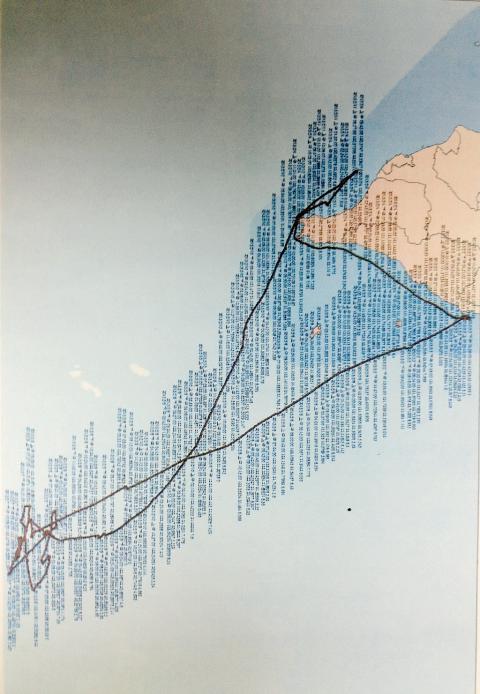|
Shipboard data
refutes Manila’s claim
MATTER OF RECORD: The Fisheries Agency released
data from the ‘Kuang Ta Hsing No. 28’s voyage recorder, while Manila refused
interviews with its coast guard personnel
By Shih Hsiu-chuan and Rich Chang / Staff reporters, with CNA

A chart released yesterday by
Taiwan’s Fisheries Agency shows the route followed by Taiwanese fishing boat the
Kuang Ta Hsing No. 28 before and after a Philippine Coast Guard vessel strafed
it on May 9, killing crewman Hung Shih-cheng.
Photo: Huang Liang-chieh, Taipei Times
The Fisheries Agency yesterday released
information concerning Kuang Ta Hsing No. 28’s position and movement throughout
its voyage to disprove the claim by the Philippines that the fishing boat had
intruded into its territorial waters, leading to the fatal shooting of Taiwanese
fisherman Hung Shih-cheng (洪石成).
From the time the 15-tonne Kuang Ta Hsing No. 28 left Siaoliouciou (小琉球), an
island off Pingtung County, on May 4, until it was disabled by Philippine Coast
Guard personnel on May 9, the voyage data recorder (VDR) system onboard “was
kept operational all along the voyage,” Fisheries Agency Deputy Director-General
Tsay Tzu-yaw (蔡日耀) said.
Tsay said the information from the boat’s VDR, which recorded vital information
related to the vessel’s operation, showed that the boat was operating within the
nation’s exclusive economic zone and had never entered the territorial waters of
the Philippines.
According to the information, the ship arrived at 20o north latitude and 123o
east longitude at 2:30am on May 7 and was operating in the area between 19o 50
minutes and 20o 10 minutes north latitude, and between 122o 48 minutes and 123o
25 minutes east longitude until 8:24am on May 9, Tsay said.
From midnight on May 9 to 6:18am that day, the ship was sailing west by south at
a speed of between 3 knots and 8 knots (5.6kph and 14.8kph) before it arrived at
19o 57 minutes north latitude, 122o 48 minutes east longitude, where it sailed
at a lower speed of between 0 knots and 1 knot, he said.
The data showed that the ship sailed at a speed of between 4 knots and 5 knots
in an east-south-east direction at 8:24am that day, while its speed increased to
10 knots at 10:12am, when its location was measured at 19o 59 minutes north
latitude, 122o 55 minutes east longitude, “presumably being chased” by the
Philippine vessel, Tsay said.
Tsay said the ship lost power at 11:24am at 20o 7 minutes, 123o east longitude,
when its speed was measured at zero, data showed.
Analysis of the information has showed that it “contained no disruption to data
recording during the voyage,” meaning that that the VDR system was operational,
Tsay said.
The claims by the Philippines that its coast guard personnel were carrying out
their duty to stop illegal fishing were “defamatory,” Tsay said.
“We have shown our evidence, but they haven’t,” he said.
Meanwhile, the Ministry of Justice said the Philippines had agreed to allow
Taiwanese investigators to board the Philippine vessel that attacked the Kuang
Ta Hsing No. 28.
Deputy Minister of Justice Chen Ming-tang (陳明堂) said the Philippines had agreed
to allow Taiwanese investigators to inspect the firearms used and compare
ballistics results with those obtained by Philippine investigators.
Chen said ministry official Yang Wan-li (楊婉莉) is now negotiating matters
involving the investigation with the authorities in Manila.
The ministry is seeking to see the video of the incident shot by the Philippine
patrol boat, but the negotiation is ongoing, Chen said.
He said the Philippines refused to allow Taiwanese to interview Philippine Coast
Guard officers, but the ministry hoped that questions prepared for the suspects
could be asked by Philippine investigators.
He reiterated that allowing Taiwanese investigators to join the probe in Manila
would not intrude on the Philippine’s judicial sovereignty.
Chen said the ministry has agreed to Manila sending a team to Taiwan.
Earlier on Monday, Philippine Secretary of Justice Leila de Lima reiterated her
opposition to the idea of a joint investigation, saying that Taiwan and the
Philippines were instead conducting “parallel” or “respective” investigations.
“It’s not advisable to agree to a joint probe, because you know, aside from
sovereignty issues involved, there is foreign policy implications involved
because of the ‘one China’ policy,” De Lima said.
However, a Taiwanese team would be allowed to view written testimony given by
the officers, De Lima said.
The Philippines has also expressed interest in sending its investigators to
Taiwan to gain further information on the shooting.
De Lima said Manila hoped to meet the Taiwanese fishermen who were on the boat
at the time of the incident and get their statements, as well as conduct another
autopsy on the deceased fisherman, if his family agrees.
De Lima said that the Philippine National Bureau of Investigation had completed
its investigation in the Philippines and was waiting to go to Taiwan to continue
the investigation there, before issuing a final report.
|
![]()
![]()
![]()